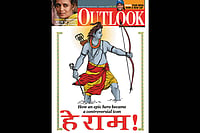It’s an Orwellian nightmare for dissenters and critics. A dystopian world of an overbearing and merciless State where people can be behind bars for simply stating a fact that cow urine cannot cure Covid, or protesting against a highly discriminatory piece of legislation. That is now. But the story of India as a totalitarian state is not new. Over the years, governments—both at the Centre and states—led by parties of all hues have used harsh laws like UAPA or NSA to detain dissenters and political rivals. How do different states stack up in the index of using these draconian laws? A walkthrough across the Indian landscape….
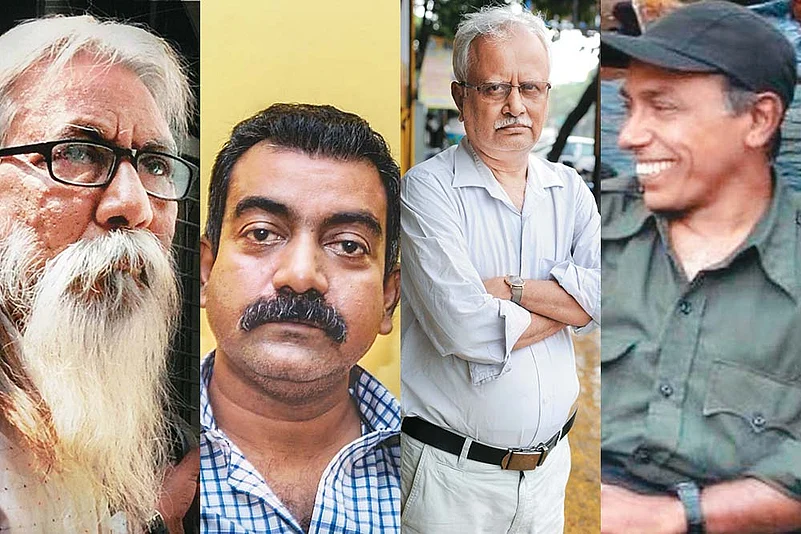
(L to R) Gour Chakraborty, Prasun Chattopadhyay, Kushal Debnath—all booked under UAPA—and Maoist leader Kishanji
WEST BENGAL
‘CPM, TMC no less guilty’
In a letter to the President that 10 Opposition leaders signed after the death of tribal rights activist Stan Swamy, they described the Unlawful Activities (Prevention) Act as ‘draconian’. But Gour Chakraborty, the second person in India, after Mumbai attack convict Ajmal Kasab, to have been booked under the new UAPA amended in 2008 by the UPA I government, believes that three signatories, Sonia Gandhi, Mamata Banerjee and Sitaram Yechuri, did not mean it. “If they consider it draconian, why did they use it? The Congress brought in the legislation, the CPI(M) first used it in West Bengal and the TMC continued with the CPI(M)’s practice,” says Chakraborty, now 75, who was acquitted in 2016.
On June 23, 2009, a day after the Centre banned the CPI(Maoist) under the UAPA, Chakraborty, who had accepted the CPI(Maoist) leader Kishanji’s offer to be an open spokesperson, was in a live talk show in the offices of a newschannel when the police arrived to arrest him.
Trade union activist Kushal Debnath, who was slammed with sections of the UAPA in 2018, echoes Chakraborty. “These parties should first withdraw UAPA cases in states ruled by them,” he says. Debnath was arrested for taking part in a movement against a power grid project led by Maoist group CPI(ML)(Red Star). He spent five months in jail before obtaining bail.
Activists say the first death of a UAPA accused in judicial custody also happened under Left Front rule. Swapan Dasgupta, who edited the pro-Maoist magazine, People’s March Bangla, was arrested in October 2009, following which his health deteriorated and he died in February 2010 at a state-run hospital.
Mamata Banerjee’s TMC government continued with the Left Front practice of charging suspected Maoists under the UAPA. In 2012, the government slapped UAPA against Debalina Chakraborty, an activist leading a movement against the eviction of slum dwellers.
According to the National Crime Records Bureau’s data, 36 cases were registered under the UAPA in West Bengal between 2014 and 2017, resulting in 102 arrests. The NIA had started some of these cases. A much higher number of cases were slapped under the UAPA during 2009-2011, when the Maoist movement in the state was at its peak.
Among the 36 cases between 2014 and 2017, 12 were in 2017, when a violent Gorkhaland agitation broke out in the Darjeeling hills. The government booked most senior leaders of the Gorkha Janmukti Morcha under the UAPA.
According to rights activist Ranjit Sur, there are 72 political prisoners in Bengal’s jails who have been accused of being Maoists. Most are charged under the UAPA. Prosun Chattopadhyay, who was arrested and charged under the UAPA in 2009 for allegedly being a Maoist, says the TMC government used it to its political advantage. “Several persons charged under the UAPA…obtained bail after they joined TMC, like Manoj Mahato, Asit Mahato and Ajit Mahato,” he says.
Prominent human rights activist Sujato Bhadra says that the CM should withdraw UAPA cases to prove her stand. “The signatories should give notice in Parliament for a discussion on UAPA, which is not only a legacy of the colonial era Rowlatt Act but contains far worse provisions than it,” he says.
Snigdhendu Bhattacharya in Calcutta
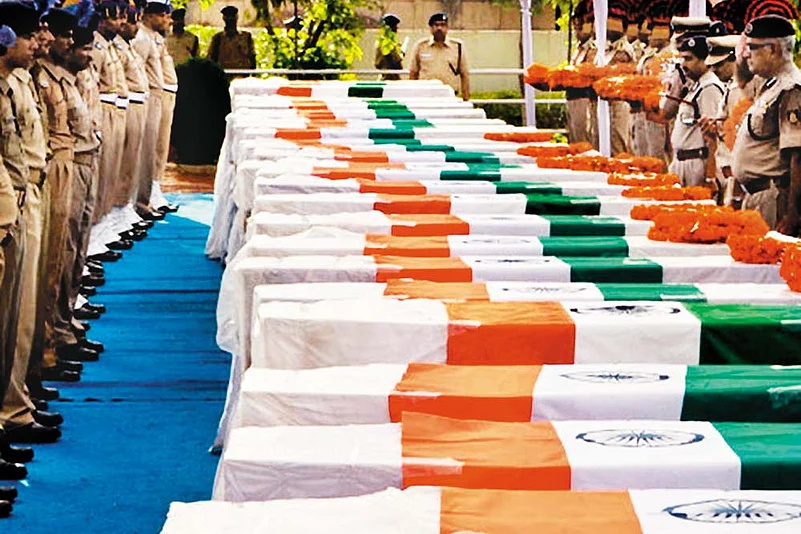
CHHATTISGARH
Sentenced Without Trial
In the past five years, Chhattisgarh Police filed 21 cases under the Unlawful Activities (Prevention) Act, most of them (10) in 2018. The biggest case, however, was filed in 2017, following the killing of 25 personnel of the Central Reserve Police Force in an ambush mounted by Maoist guerrillas near Burkapal village in Sukma district. A few days after the attack, 120 Adivasis were arrested, including 37 from Burkapal. “I was lucky as I was in Andhra Pradesh and my name didn’t make it to the list,” says Muchaki Handa, the elected village head, whose brother was charged under UAPA and sections of the Indian Penal Code. “Every male living in the village was named as a Maoist and put in jail. Seven minors were also detained, but they were released after 18 months. For the others, even the trial is yet to begin.”
Of the 120 people arrested in the case, nearly 50 are in the age group of 18-25. For hundreds of families like Handa’s, UAPA has no special meaning. All they know is that their kin are in jail because they have been accused of being Maoists. Take, for instance, the case of Hinga Markam, a student of Class 8, whose uncle is among those arrested in the Burkapal case. Having lost both his parents, he was living with his uncle. Now he and his younger brother are being looked after by social workers in Dantewada district. “I still don’t know why my uncle is in jail,” says Markam. “Villagers say he won’t be coming back anytime soon and I feel sad. He used to take care of us and now we can’t even see him.”
Activists claim hundreds of Adivasis have been charged under the UAPA, which enables long periods of undertrial, often pre-trial, imprisonment. For undertrials who are too poor to afford expert legal counsel, proving one’s innocence in court can be quite a long and uphill struggle. The police, however, deny allegations of misusing the law. “Special laws like the UAPA and the Chhattisgarh Special Public Security Act have been enacted to deal with members and supporters of outlawed outfits that pose a serious threat to internal security,” says P. Sundarraj, Inspector General of Police, Bastar range. “Law enforcement agencies use these laws as per the ground requirement and prevailing situation.”
Change in government has not changed the strategy of combating the Maoist insurgency, with both major parties in the state—the BJP and the Congress—favouring an armed response. While 16 UAPA cases were filed during 2015-18 when the BJP’s Raman Singh was CM, there have been five cases since Bhupesh Baghel of the Congress became CM in December 2018. Activists say the modus operandi remains the same: every time there is a Maoist attack, Adivasis are arrested from nearby villages. “Over 2,000 people have UAPA charges against them in the Bastar region,” says Sanjay Jaiswal, advocate for over 60 accused in the Burkapal case. “Their trials are pending as police haven’t been able to frame charges in court.” According to activist and lawyer Bela Bhatia, bail is routinely rejected in such cases, ensuring that those arrested spend a long time in jail waiting to be acquitted—conviction rate is less than 2 per cent.
Vishnukant Tiwari in Raipur
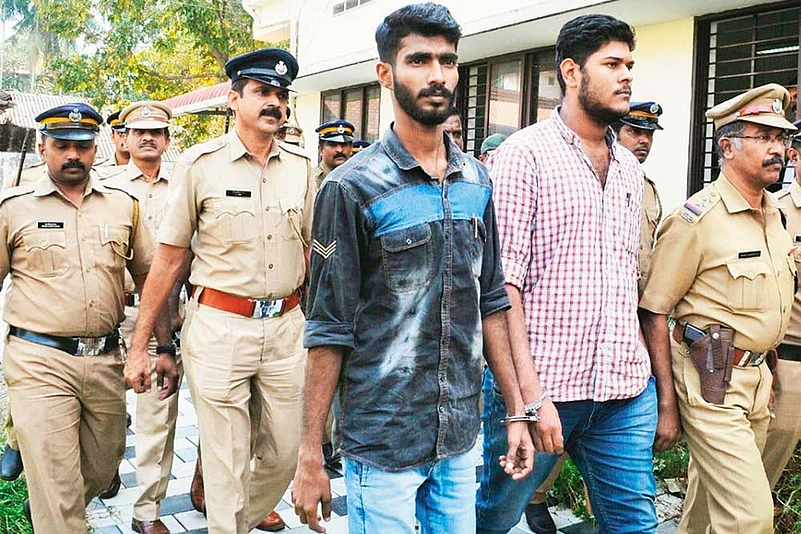
KERALA
Do They Practise What They Preach?
“Travesty of justice,” wrote Kerala chief minister Pinarayi Vijayan on social media, expressing his anguish over tribal activist Stan Swamy’s death in a Mumbai hospital, after a prolonged wait for bail. The apathy and injustice around the death of the Jesuit priest, who was arrested under UAPA, put the spotlight back on the misuse of the law in states across the country.
But do Left parties—one of the main votaries of scrapping of UAPA—practice what they preach? Statistics don’t match up to the claims of the CPI(M)-led Left Democratic Front (LDF), which is ruling Kerala for a second term. The CM himself admitted during the June assembly session that 145 UAPA cases were registered in Kerala between May 25, 2016 and May 19, 2021. He also said though the state police chief sought government permission to prosecute eight of the cases, only three were given the green signal so far.
Though the number of cases registered under the law is on the rise, the presence of a review committee, set up in 2017 by the first Pinarayi government, is a minor protection, say legal experts. The three-member committee, led by a retired judge, was set up in 2017 after the state government faced flak when police slapped sedition charges on four rights activists for “disrespecting the national anthem”. After widespread condemnation, the CPI(M) government set up the committee, promising to review all UAPA cases registered in the state from 2010, barring those under the National Investigation Agency (NIA). According to reports, police withdrew 42 UAPA cases based on the committee’s reports.
Kerala high court lawyer Harish Vasudevan says misuse of UAPA can be prevented to an extent in the state as police can’t file a chargesheet without the committee’s approval, while agreeing the law is being widely misused even in Kerala, citing the case against young students Allan Shuaib and Thaha Fasal.
The two were arrested from Kozhikode in November 2019 for their alleged connection with a banned Maoist outfit. After police slapped UAPA on the basis of posters, diaries, books and banners confiscated from their houses, it turned out the duo were active members of CPI(M). Though a section of the party also came out in support of Shuaib and Fasal, the CM continued to toe the police line. The case was taken over by NIA and both remained in jail for over 10 months, when, in September 2020, a special NIA court granted bail to both, dismissing police theories that possession of Maoist literature, participation in anti-government protests or ideological beliefs, form grounds for the charges.
Preetha Nair
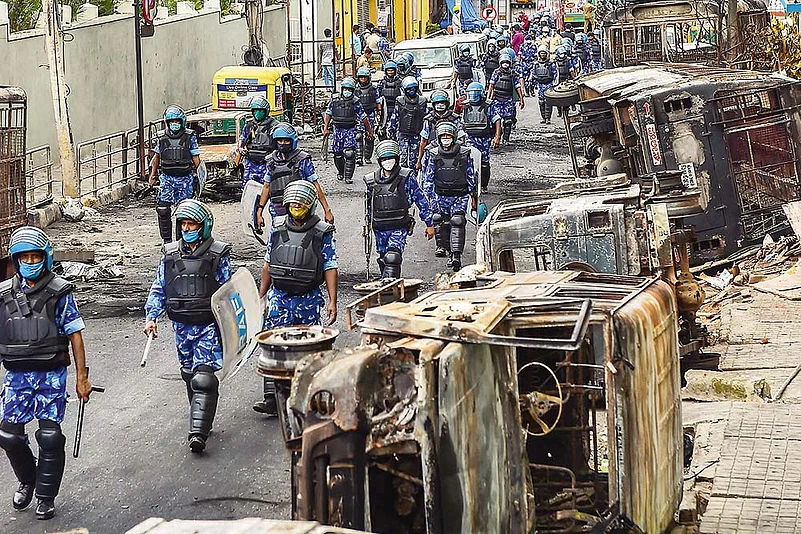
KARNATAKA
Facebook=Riots=UAPA
The Karnataka High Court granted this June default bail to 115 people accused under sections of the UAPA in cases pertaining to riots that had taken place in an east Bangalore locality last year. These people were arrested in August 2020 following the violence and they moved the trial court for bail in November as the National Investigation Agency—which took over the case—had not completed the investigation within the stipulated 90 days. By then the agency had filed its application seeking extension of time, which was granted. Hence, their statutory bail application was subsequently dismissed.
The accused moved the high court and highlighted that they were not heard by the trial court before passing orders on the extension and neither was a copy of the application served on them nor were they present when it was being heard. The high court set aside this June the trial court’s order on extension of time, observing that it was ‘bad in law’ and granted default bail. “The fundamental right of an individual recognised under Article 21 of the Constitution of India cannot be defeated other than in accordance with law,” its order states.
The violence in Bangalore’s KG Halli and DJ Halli localities—allegedly triggered by an offensive Facebook post by the nephew of an MLA and in which Social Democratic Party of India members were suspected—was a rare instance of UAPA sections being invoked in a case of rioting in Karnataka, according to some reports. Former Karnataka state public prosecutor and human rights lawyer B.T. Venkatesh recalls UAPA being applied over the past two decades in several cases—notable instances being the terrorist attack on the Indian Institute of Science in 2005, a 2007 terrorism case involving a Kashmiri man from Hampi and the 2008 Bangalore blasts. “I’ve been conducting these cases much before the 2008 amendment,” he says. “It’s very difficult to get bail in UAPA cases. The moment UAPA is slapped it is like the accused is presumed to be guilty even though we follow the adversarial system of criminal jurisprudence.”
Advocate Narrain Arvind, formerly a founder-member of the Alternative Law Forum in Bangalore, reckons it is comparatively easier to get bail in a sedition case. Between 2015 and 2019, there were 22 cases related to UAPA in Karnataka. The standard for registering a UAPA case is an offence which affects the security of the state, but this threshold is usually not met in most cases, Arvind says.
Ajay Sukumaran in Bangalore
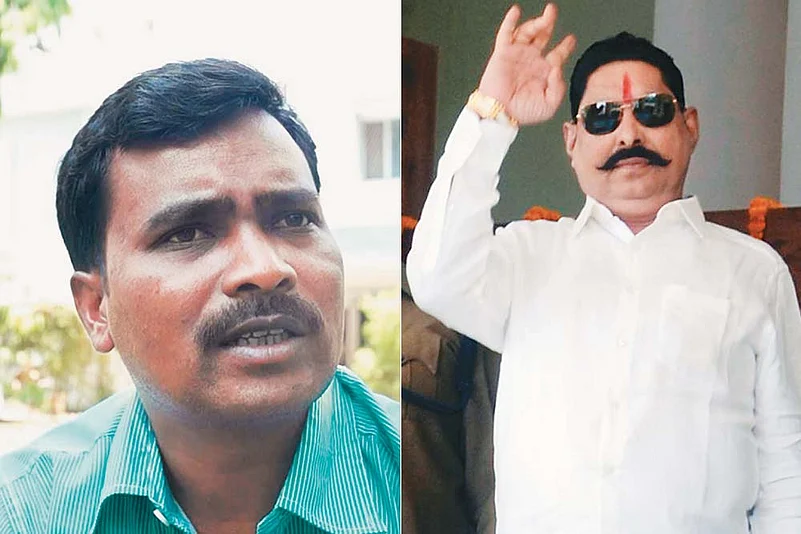
JHARKHAND /BIHAR
Maoists and Bahubalis
In the killing fields of Jharkhand, where Maoist insurgents and security forces are locked in a never-ending war for decades, human rights have been the biggest casualty. And nothing exemplifies this more than the death of Ranchi-based tribal rights campaigner and Jesuit priest Stan Swamy in judicial custody. A report prepared by Swamy in 2016 said allegations against people accused of having Maoist connections could not be proved in 97 per cent of the UAPA cases. Most importantly, a large number of them were tribals. The report provided details of how police jailed innocent villagers on the charge of being Maoists, though they were merely protesting against land acquisition or were grassroots political workers exhorting people to vote against a particular party.
Swamy’s death has naturally ignited passions and sparked protests in Jharkhand. Several voluntary organisations and political parties are gearing up to launch a big movement against the UAPA under which he was arrested last year. Arvind Avinash, state secretary of the People’s Union for Civil Liberties (PUCL), says several organisations will stage a protest against the law on the birth anniversary of socialist freedom fighter Chandrashekhar Azad on July 23. A social media campaign will also run from August 15 to 28. This month, they will discuss ways to chalk out a common strategy for a nationwide movement with ten political parties that have condemned Swamy’s death.
Advocate Shailesh Poddar, who specialises in human rights cases, says that mere opposition to the government is often deemed to be sedition. “But you cannot blame one regime. Whichever government is in power uses this law as a tool to suppress the voices raised against it,” he says. “The conviction rate, therefore, in such cases is barely two to three per cent.” According to a retired senior police officer, laxity in enforcing the act, lack of trained officers, workload and the dearth of resources are the major reasons behind the low rate of conviction.
For example, Jitan Marandi, 34, a known socio-cultural activist from Giridih, was sent to jail as a ‘hardcore Naxal’. His wife, who was going to attend a human rights convention in Hyderabad, was later arrested from Ranchi. Similarly, Lakhan and Mahadev, two farm workers from West Singhbhum, were jailed under the act on similar charges. None of them have been found guilty so far. There have been many such examples in the state.
In Jharkhand, a large number of the cases are still awaiting sanction for trial. The previous Raghubar Das government had given the nod for trial against more than 150 people in Khunti. The Hemant Soren government had promised to withdraw the sanction but the legal process in most cases is still on.
In June this year, Giridih deputy commissioner sent a proposal to the government to invoke UAPA against 11 Maoists, including Anil and Ajay Mahto, who carried rewards of Rs 1 crore and Rs 25 lakh respectively.
As in Jharkhand, most of the UAPA cases in Bihar too have been registered against suspected Maoists. But there are some notable exceptions too. In 2019, after the seizure of AK-47s and other weapons from the house of MLA Anant Singh, he was booked under UAPA by Bihar police. Singh, now with RJD, was a JD-U MLA until he fell out with chief minister Nitish Kumar.
Navin Kumar Mishra in Ranchi
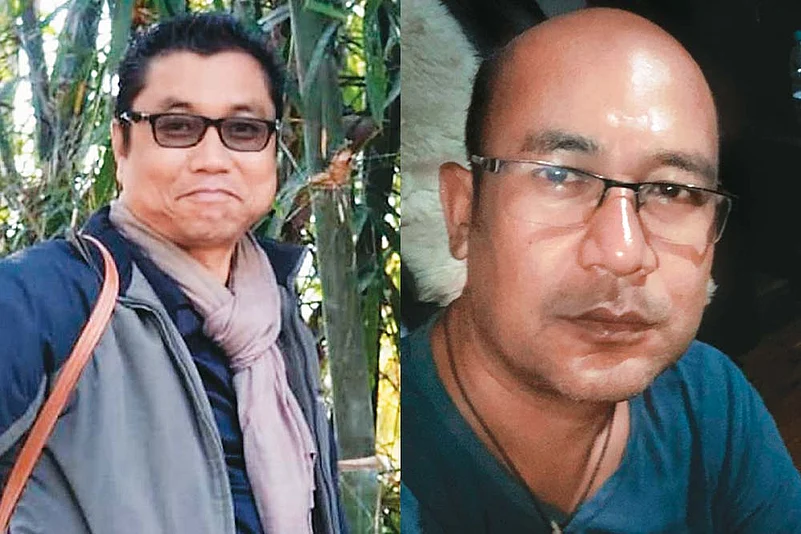
MANIPUR
On Top of the India List
“It is known that Manipur is a powerhouse of sports, and our state has won many medals, but what should also be known is that we also have won the gold medal when it comes to the number of cases and arrests under the UAPA,” says journalist Paojel Chaoba. It’s hard to miss the sarcasm—even harder to miss the truth. Between 2015 and 2019, Manipur recorded the highest arrests in the country under the draconian law. NCRB data shows at least 2,158 people were arrested in 2,426 UAPA cases in five years. The number is way bigger than second-placed Uttar Pradesh where 1,397 people were arrested in 343 cases during the same period. Manipur, where several militant outfits are active, has seen prolonged violence that has left thousands of civilians, security personnel and militants dead over the past few decades.
Chaoba, the executive editor of online news portal, The Frontier Manipur, was arrested along with its editor Dhiren Sadokpam in January this year over publication of an article whose author M. Joy Luwang was also booked. A police statement said the author “openly endorsed revolutionary ideologies and activities and expressed shock and dismay at the deteriorating character of the armed revolutionary leaders of Manipur in the recent decade”. They were, however, released the very next day after the media fraternity raised its voice against the arrests. “It only shows that UAPA can be slapped on people at the government’s whim. It is also evident that the law is a mechanism to coerce and subjugate you and tell you who is the boss,” he says. The case is still open, but charges under UAPA have been withdrawn.
The following day the Foundation for Media Professionals in a statement said that leaders of insurgent outfits have even attained important positions. “They were not charged with sedition or terrorism…It is therefore odd that mere publication of an OpEd article on some such groups should draw extreme charges upon editors,” it said.
Babloo Loitongbam, executive director of Human Rights Alert, echoed Chaoba, saying the UAPA was being used in the state with impunity. “It is a pathetic situation,” he says, adding that apart from the high number of arrests, the number of organisations banned under the Act in Manipur was also highest in the country going by the comparative population size. There are six organisations banned in the state, but these are all underground outfits. Imphal-based advocate Victor Khongampt regrets that Articles 21 and 22 were being violated in the state. “Not only UAPA, provisions of CrPC are also trampled upon,” he says. Narrating a case, he says during the first wave of Covid-19, some militants arrested in Myanmar were sent to Manipur by a special aircraft. They were placed under quarantine after which they were put in judicial custody and charged under UAPA. They were not in India at the time of the events mentioned. We are no longer in an insurgency situation in the state yet trends have not changed.”
Dipankar Roy in Guwahati
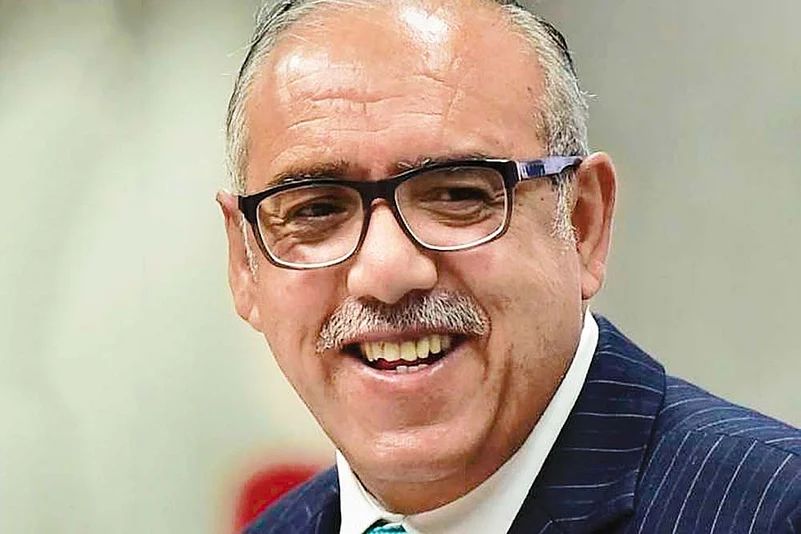
"Section 124A of the Indian Penal Code (the law defining sedition) should be immediately abolished. Or at least the Supreme Court should lay down detailed guidelines about how police should frame charges. Right to dissent is a hallmark of democracy."
Justice (retd) Deepak Gupta on sedition
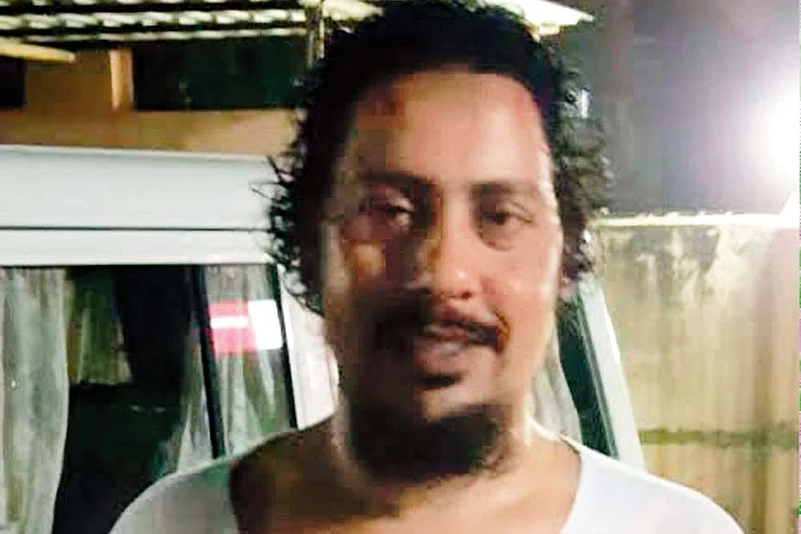
ODISHA
Many Arrests, Few Convictions
Pratima Das still shudders as she remembers the fateful day, more than a decade ago, when she was arrested in 2008 under the stringent UAPA, along with the sedition law. The Odisha advocate, however, had the last laugh when she was acquitted in both the cases in 2010. It proved that she had been falsely implicated in the case that had sought to paint her a Maoist. “I was duly acquitted. But who will compensate for the trauma and humiliation I and my family went through during those two years?” asks an angry Das, who has filed a case in the court seeking compensation. Like Pratima, activist Tapan Mishra of Athmallick was arrested under UAPA, again for alleged links with Maoists, and had to spend 18 months in jail before he was acquitted.
Another highly-publicised UAPA case in the state was the arrest of Abdur Rahman for alleged links with al Qaeda. The cleric was arrested by the special cell of Delhi Police with the help of Odisha Police from the outskirts of Cuttack in December 2015. His bank accounts, which reportedly showed dubious transactions, were seized and a madrasa illegally run by him at Tangi was disbanded. The 80 students enrolled in it, a majority of them from neighbouring Jharkhand, were repatriated.
There have not been too many cases registered in Odisha under the dreaded law in the recent past. As per NCRB data, just 10 cases have been registered and six people arrested, five of them in 2019 alone, under UAPA in the five years till 2019—the latest year for which figures are available. There were no cases registered or persons arrested for two successive years in 2017 and 2018.
But there was a time not long ago when hundreds of people, a majority of them tribals in southern Odisha fighting for their land rights, were arrested under the UAPA. “As per our records, more than 300 people were arrested under the UAPA, about 270 of whom were involved in the land rights agitation in Narayanpatna, at the height of ‘Operation Green Hunt’ between 2010-11 and 2013-14. Each one of them was later acquitted by the court,” says Deba Ranjan, general secretary of Ganatantrik Adhikar Suraksha Sangathan (GASS), a civil rights organisation.
“While slapping UAPA, the police know very well that the case would not stand scrutiny in the court. But they go ahead nonetheless, primarily to crush dissent and harass those raising their voice for justice and an end to exploitation. An act like UAPA should have no place in a democracy,” says human rights activist Biswapariya Kanungo.
Sandeep Sahu in Bhubaneswar
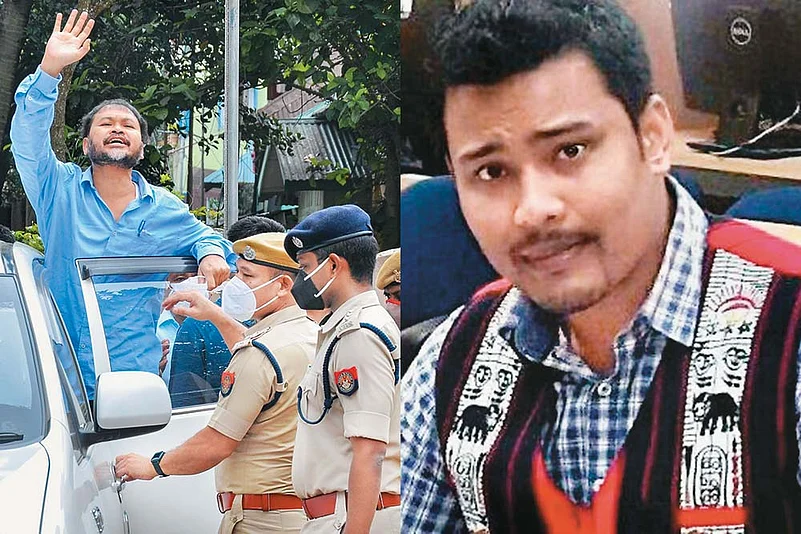
ASSAM
No Space for Dissent
“…This court is constrained to observe, in the interests of justice, that the court has found the conduct and approach of the investigating authority/prosecution in this case, to be discouraging, to say the least. The court has high expectations from a premier investigating agency like the NIA…The court hopes and expects that such high standards will be upheld, for the sake of the country and this one will be just an exception.” The remarks of the judge while exonerating Assam MLA Akhil Gogoi of all charges, including those under the UAPA, sum up the case that the government used to put the activist behind bars for 18 months. Assam recorded 847 cases and 1,003 arrests under the law between 2015 and 2019, according to NCRB data.
Gogoi’s arrest in December 2019, following protests against the Citizenship (Amendment) Act, was among the first detentions in the country after the UAPA was amended to additionally empower the government to call any suspect a terrorist and detain the person. Gogoi was arrested in two cases registered in Dibrugarh and Guwahati. The NIA took over the cases later. Before him, ONGC employee Jnyanadeep Gogoi was arrested in June 2019 for Facebook posts supporting the banned Ulfa(I). Jnyanadeep was accused of “expressing opinions and views in support of an outfit declared unlawful and a terrorist organisation”. He is out on bail.
According to a police officer, most UAPA cases in Assam involve militants. “They cannot avoid the UAPA given that they belong to orgainsations held illegal. Even Akhil was booked under UAPA for his alleged links with Maoists. It is, however, a different matter that the prosecution could not substantiate the charge,” he says.
Dipankar Roy in Guwahati
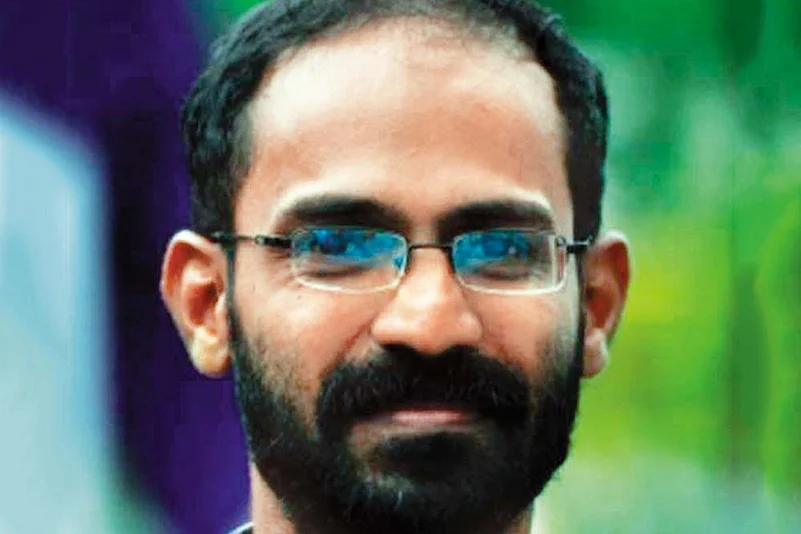
UTTAR PRADESH
Clipped Wings
Earlier this July, Uttar Pradesh’s additional chief secretary (home) Awanish Awasthi announced that a two-member committee had been set up on directions of chief minister Yogi Adityanath to review all cases filed in the state under UAPA and the National Security Act. The formation of a committee to review cases filed under the UAPA is a less-talked-about requirement stated in the law itself. As such, the government was already legally-bound to set up the panel.
What should have triggered a debate, though, was why the government had not constituted the panel earlier considering that the state had, since Adityanath assumed office in early 2017, witnessed a steady rise in UAPA cases. Days after the announcement, a Mathura court denied bail to journalist Siddique Kappan, who, along with three others, was arrested by UP Police last October. Kappan was arrested while trying to reach Hathras to report on the alleged gang rape of a 19-year-old Dalit woman by four upper caste Hindus. For this ‘crime’ of performing his journalistic duty, Kappan was slapped with various charges, including sedition and UAPA. Barring five days of interim bail by the Supreme Court earlier this year to enable him to see his ailing 90-year-old mother, Kappan has remained in jail since his arrest on October 7. Kappan’s mother passed away on June 18 in Kerala’s Malappuram and the jailed journalist could not even attend her last rites.
Of course, Kappan isn’t the only ‘victim’ of the UP government’s proclivity for invoking UAPA and other equally draconian laws to penalise individuals. As many as 498 people were arrested in UP in 2019 alone under the UAPA, a manifold increase from the 38 people arrested under the same law in the state during the last two years of the previous Samajwadi Party government. Besides UAPA, the wanton use of other laws such as sedition, NSA, the Criminal Law (Amendment) Act, 1932, and Prevention of Damage to Public Property Act (PDPPA), 1984, has been common in UP. In December 2019, for protesting against the controversial CAA, over two dozen people, including former IPS officer S.R. Darapuri, actor and Congress leader Sadaf Jafar and activist Pawan Rao Ambedkar were arrested.
A retired DGP of UP, tells Outlook on condition of anonymity, “The abuse of laws like UAPA to target those who have become irritants for the government has, unfortunately, become common practice...The setting up of the panel will be meaningless if the assessment is carried out purely to defend the government’s stand instead of scrutinising actual evidence, which in most UAPA cases is often very thin as evident from the dismal conviction rates in such matters.”
Puneet Nicholas Yadav

TAMIL NADU
‘Quantum Leap in 2019 Figures Erroneous’
In Tamil Nadu, the Unlawful Activities (Prevention) Act has been used by the National Investigation Agency against alleged ISIS supporters, while the state police have used them mostly against Maoists. There are only 98 cases under UAPA registered by the state police from 2008 to 2021. Out of these, nine cases have been transferred to the NIA.
NIA sources say that they have registered 27 cases against ISIS suspects from Tamil Nadu in the last five years and arrested 40 people. In October 2019 IG of NIA, Alok Mittal, disclosed that the NIA had so far arrested 127 people who were found to have connections with ISIS. Of those arrested, 33 are from Tamil Nadu, 19 from Uttar Pradesh, 17 from Kerala and 14 from Telangana.
The most important case was the murder of Wilson, a special sub inspector of police, at a check post on the Kanyakumari-Kerala border district on January 8, 2020, for which six accused were arrested from Maharashtra. The NIA has charged them—Abdul Shameem, Y. Thowfeek, Khaja Mohideen, Mahboob Pasha, Ejas Pasha and Jaffar Ali—under sections of the Indian Penal Code, including murder, UAPA, and the Arms Act. In January 2021 the NIA arrested Sirajudeen, another wanted person in the case, at the Chennai airport when he was deported from Qatar, where he had absconded.
The NIA’s biggest catch came in July 2019 when it arrested 14 people after they were handed over to India by Saudi Arabia for allegedly attempting to raise funds to set up the terror outfit Asnarulla in Tamil Nadu. The arrested were inspired by Al Qaeda and ISIS and were from Melapalayam, Tiruvarur, Nagapattinam, Ramanathapuram and Chennai.
In June 2019, the NIA, after raids across Coimbatore, arrested Mohammed Azarudeen, the alleged ISIS mastermind who recruited youth from TN and Kerala. The NIA statement said that he was on friendly terms with Zahran Hashim, the alleged mastermind behind the Easter Sunday terror attacks in Sri Lanka.
The figure quoted in the Lok Sabha in March 2021, that 270 cases were registered and 308 people arrested in Tamil Nadu under the UAPA in 2019, is erroneous, say state officials. They point out that the number of cases in each of the previous years was less than 20 and that there cannot be a quantum leap in 2019. “It clearly appears to be a typographical error since, UAPA cases in Tamil Nadu have never crossed even 50 any time,” says a senior police officer. In 2019, only six cases were registered under the UAPA by Tamil Nadu Police, he discloses. The NIA cases, too, could not have crossed 20 in 2019, he says. The highest number of UAPA cases registered by the state police was 18 in 2016.
To prove his point, he referred to the Union home ministry’s chart with regard to states like Assam, Bihar, Jammu and Kashmir , Jharkhand, Manipur and Uttar Pradesh, which have shown a high number of cases since 2015 leading up to 2019, whereas a similar pattern was not visible for Tamil Nadu.
G.C. Shekhar in Chennai
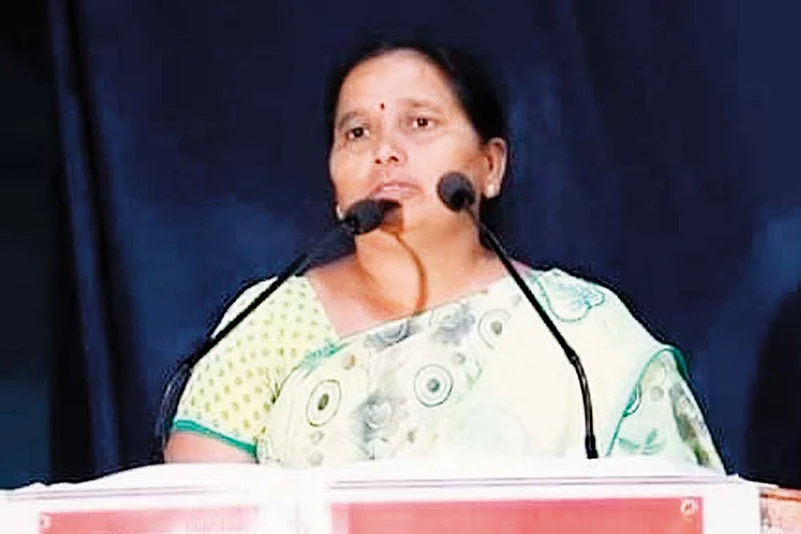
ANDHRA PRADESH
Lawfare in Telugu Land
Of all the cases under the Unlawful Activities (Prevention) Act in Andhra Pradesh since 2008 (Telangana was hived off in 2014), trial was completed in only one case and all the accused were acquitted. Besides that case, there is just one more in which a chargesheet was filed. As many as 450 UAPA cases were filed against 150 people in Visakhapatnam district alone since 2016. There are a large number of cases in neighbouring Vizianagaram and East Godavari districts too. These three districts have seen decades of Maoist insurgency. The majority of those arrested are Adivasis. Many of them have been arrested for allegedly attending meetings of organisations linked to the outlawed CPI(Maoist), or for providing food to guerrillas visiting their villages.
“For Adivasis in the region, it has become mandatory to attend meetings organised by the Maoists as well as those conducted by the police,” says Gutta Rohith of the Human Rights Forum (HRF). “They also have to feed people from both sides. It is really difficult to know whether they play host to Maoists out of fear or because of their admiration for them.” Whatever be the motivation, attending a Maoist meeting or providing them food is sufficient reason to be charged under UAPA and sent to jail, where they languish for months awaiting trial. The police don’t file chargesheets in most cases, allegedly to prevent the undertrial from getting bail.
According to Visakhapatnam-based HRF activist Krishna, UAPA has been used even in cases that have nothing to do with Maoists. “For example, it was slapped on two members of the CPI(M) and six of the YSRCP as they were opposing plans of the then TDP government to mine bauxite in Visakhapatnam district,” says Krishna. When Y.S. Jagan Mohan Reddy of the YSRCP became CM in 2019, the fact that his party colleagues had been charged under UAPA did not deter him from continuing the use of the law—as many as 20 UAPA cases were filed across the state soon after he took power.
In November 2020, two UAPA cases were filed in which 90-odd people were named. Of 87 named in the case in Visakhapatnam’s Munchingput police station, 45 were activists with organisations that have been working openly for decades. As many as 27 cases were filed at Guntur’s Piduguralla police station, naming 25 people working with overground organisations. Twenty of them were also accused of involvement in the Munchingput case. It started with the National Investigation Agency arresting P. Naganna at Munchingput and claiming to have recovered Maoist literature, press notes and other incriminating material from his possession. This was followed by arrests of activists of HRF, Civil Liberties Committee, Revolutionary Writers Association, Praja Kala Mandali, Chaitanya Mahila Sangham, Kula Nirmoolana Porata Samithi, Patriotic Democratic Movement, Amarula Bandhu Mitrula Sangham (ABMS), Committee for the Release of Political Prisoners, Pragatisheela Karmika Samakhya and Indian Association of Peoples’ Lawyers. Of the six arrested in the Munchingput case, five were activists with open organisations; there were seven such activists among the eight arrested in the Piduguralla case. B. Sagar, son of B. Anjamma, an arrested ABMS activist, says the cases against his mother and others were fabricated to silence rights activists. “Is it a crime to ensure that bodies of those killed by police are handed over to their families?” asks Sagar.
M.S. Shanker in Hyderabad
(This appeared in the print edition as "Abusing The Terror Laws")


















